Experiencing FOSDEM 2024
It's a cold and dreary February night when my phone's absolutely annoying alarm rips me out of my sleep. Actually—I have no idea if it's cold and dreary outside. I would like to think it is, though, as it is so warm and nice indoors——But no. My flight is soon leaving for a weekend of meeting fun and interesting people, and it's most certainly time to get up, get dressed, grab my luggage, and go!
...Plus, my phone's equally annoying ringtone fills the room less than a minute later, and I scramble to pick it up lest it wakes up all the neighbors around. Sigh. The wonders of modern volume defaults.
My FOSDEM experience starts just an hour later—at the airport...
(Click to skip to my takeaways)
Wait, what is FOSDEM?
FOSDEM is an international two-day conference dedicated to free/open-source software (and hardware) that occurs every February in Brussels, Belgium, at the Solbosch campus of the Université Libre de Bruxelles / ULB.
Meanwhile, free/open-source software (FOSS) is software which is free to use, study, modify, and reshare in any way one sees fit—unlike proprietary software which is encumbered and locked down through copyrights and patents.
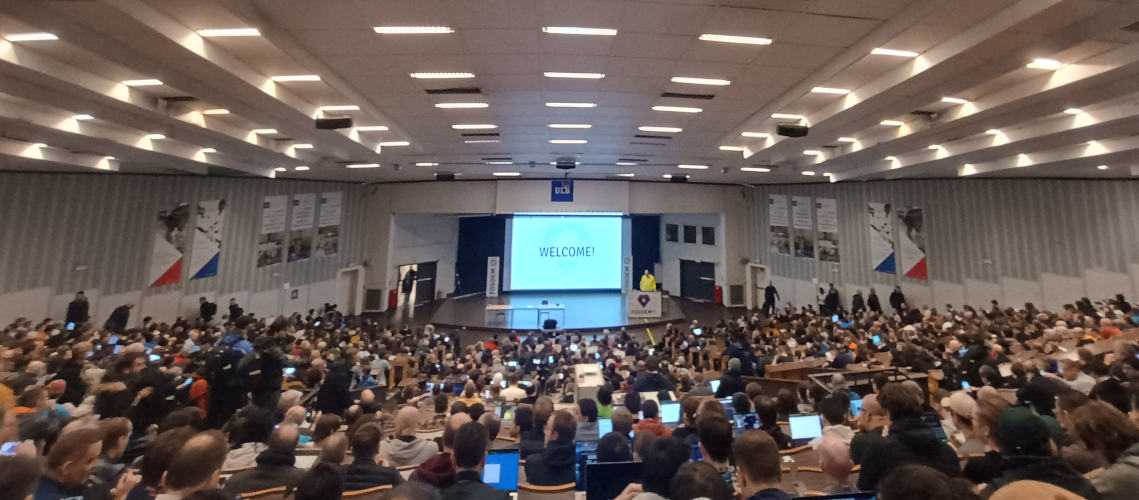
People attending FOSDEM come from a variety of walks in life. Some are contributors or even maintainers of open-source software. Others are from companies offering services for deploying and administering open-source software. Yet others are professionals who use open-source in their day-to-day jobs: system administrators, DevOps, software developers, hardware manufacturers. And finally, some are not all that technical, but are still very enthusiastic about the freedom that open-source software gives them and come anyway. There are no admittance fees for the conference, and no limitations on who can attend other than the physical limits of the rooms themselves—but even when those fill, there are live streams available for all talks.
In addition, people at FOSDEM come for a variety of reasons. Some come to meet with old friends and acquaintances. Some are there to see the many talks and presentations given (800+ talks spread over 60-70 tracks, covering topic ranging between AI, policy issues, community, and programing languages). And some come to explore the stands, where different open-source projects and companies present themselves and typically offer stickers and merch. Plus, of course, a few come to present talks or to staff the stands—we wouldn't have much to attend without them!
As you might imagine, all this makes for a very chaotic and diverse environment where one can meet people from all over the world. Yet somehow, all of them are familiar in a way—they speak English, are excited about technology, and have some taste for freedom.
Earlier years, I went to FOSDEM mainly to help at the Godot stand. But for this year, I decided to instead try to get to know a variety of attendees—and this is the first conference on which I intentionally seek people to network with. In addition, I am, more than in previous years, under the conviction that intellectual property is wrong and open-source software and libre art is the only future for software and art there can be (to be expanded in another article) and want to turn my life and career around that idea. Due to that, I made of list of talks related to making a career in open-source software—hoping that I might meet others with similar beliefs and goals there.
Friday, pre-conference
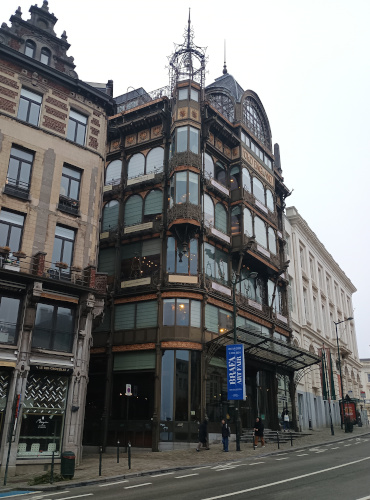
So, where was I? Right.. Friday morning. All the way back at the airport, waiting for boarding to start.
I amble around aimlessly, when I stumble across a few friends from earlier FOSDEMs chatting in the nearby cafe—and next to them, even more people in various FOSDEM, Linux, and OpenFest t-shirts. I figure it's time to start my experiment with talking and networking with people—after all, if I can't do it here, with friends, I won't be able to do it anywhere. So, I order myself a sandwich and sit beside them. Naturally, I instantly forget all the talking points I had prepared earlier, and miss telling them what I've been working on lately.
Still, I end up talking with a cool guy sitting nearby; he is a system administrator/DevOps person with interests in music and streaming—and as a nerd myself, it feels right at home to listen to him explain how he set up an open-source streaming solution for music and gaming. I quickly collect his website's address before we get split due to the seat assignments in the plane.
But, conference doesn't end there. On the plane, luck would have it that I am sitting right next to another FOSDEM-going Bulgarian—though he is sleepy and not a ton of conversation happens there.
After arriving at Charleroi, we have to take a bus to Brussels; yet, due to the farmer protests going on, our bus gets delayed by over 3 hours before the queue finally clear in front of us. I stick next to a person from a hardware company and one from a large software company, and we have an distracted conversation about open-source, radio protocols, politics (this will be a recurring theme, I suppose I am that old now), operating systems, laptop models, and world history.
Once we arrive, we have lunch with other FOSDEM-goers from that same bus, and finally part ways for the day—swaping contacts in case we organize something later on.
I spend the rest of the day browsing through a few museums in Brussels. The Comic Museum explores the art of Belgian comics, though I wish I had spent more time with classics like Tintin before going in. Meanwhile, the Parlamentarium is a great place to learn more about recent European history, and proves eye-opening in how our view of European policies might be different from the politicians' view of the same.
Score for the day: 9 people talked with out of a target of zero; inf% over par!
Saturday, day 1
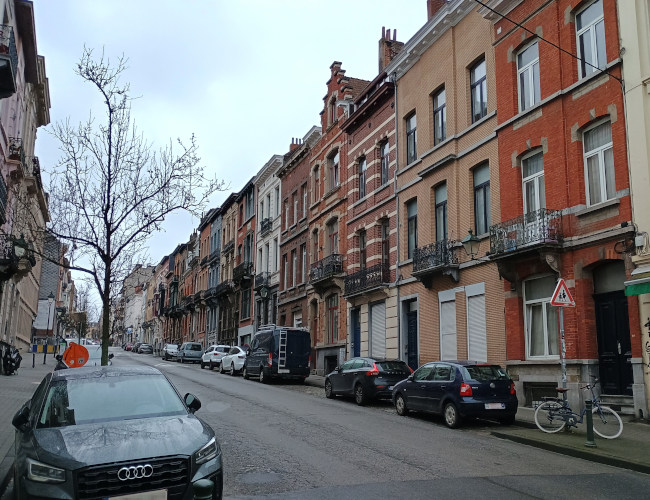
During FOSDEM, it is common to run into attendees all across Brussels.
Saturday morning there is already a large crowd in line for tickets as soon as I get to the tram stop. I grin and start a conversation with a nearby person who also got the memo that Brussels public transport also works with contactless cards nowadays. He happens to be an open-source user and contributor from Romania, and we chat about politics, of course, but also technology. Looking at his website now, it looks like we've had similar inspiration to draw upon. We attend the welcome keynote in J together, then head over to the K building for the first talk there, that we somehow both have on our lists.
It is a Ryan Sipes's talk about the revival and funding of the Thunderbird project, and how they had success in asking for donations. I enjoy hearing that Marketing/Business 101—providing a clear call to action and actually making an ask for money—applies to open-source projects just as much as it applies to other businesses and creative works... as it is exactly what we were learning in novel-writing. He also makes a good point about how asking for donations serves users better than silently leaving the project to rot.
After that talk, I have 2-3 others on my to-attend list (including one overlapping that talk itself), but I instead opt to meet with some old friends from Godot. It is nice catching back up with them and hearing how things are going with the project and Foundation and various companies since I parted ways—though I get so carried away with talking with them, that I miss a whole talk, and come in late for the career path in open-source panel discussion back in the J building—I will have to listen to the recording of that.
Next major talk for the day is Filippo Valsorda's talk on his experiment as an independent professional maintainer—having followed his journey on his blog so far, I don't want to miss it. Funnily enough, right before that talk, I go to the food stands area, and the person next to me in the queue for pasta turns out to be going to that same talk too—and, to talk about coincidences, they are attending it together with yet another Bulgarian FOSDEM attendee!
Still, back to the talk, I am thrilled to learn Valsorda's experiment has been working well so far, and that he is looking at ways to expand it to include more maintainers—makes me wonder if I should try going that way, instead of going with my own vague career-plan-in-the-works. After the talk, I go down to the stage and chat a bit with Filippo and with a few of the other people chatting with him—one of which seems to be doing things with FUSE filesystems, and I think I will want to swap notes with him.
After that, I end up wandering around the stands in K and talking with representatives of various "old-timer" projects such as OpenSSL, XMPP, and LibreOffice, along with some new and upcoming ones, like Feeel. A question I ask at almost every stand is "Why should I use your project instead of (another open-source alternative) for (usecase)"—and the answers vary widely, but are fun to listen and then follow up with further questions.
Later, I go to the H stands area too, and grab a few stickers from the KDE stand. This time, I ask a slightly more pointed question: "How come a minor KDE release ended up breaking compatibility with my wallpaper plugin, and could it please work under the KDE-Wayland integration too?". Something I do not anticipate, however, is their response: "just come and ask in KDE's official developer mailing lists, and perhaps get that wallpaper plugin upstreamed!"—and, thinking about it, of course, I should have contacted them a lot earlier! Point taken: open-source projects are very easy to reach; you don't need to meet the developers in-person to get bugs fixed, you just raise your concern in the right place.
At that point, I am pretty tired from the day as I've been lugging a laptop around all that time, so I check what's on, and turn in for Kelian Christophe's talk on WebRTC encryption happening in a nearby room. At the end of it, I stumble across an IPFS developer—and I take that chance to ask if there is any way I might help with an unmaintained piece of IPFS-related code I ran into while working on my last project.
After I get out of that room, I strike a conversation with a person hanging around in the hallway at random—and though we start from small talk like "How did you enjoy the conference so far?", he turns out to be one of the most fun people I chat with that day. We talk for hours, first in the hallway, then outside once we get kicked out, then in the tram to central Brussels, then over dinner (with the Godot folks who invited us to tag along). It seems like almost everything he's worked on is one of my vague interests—be it text editing, Lisp languages, microkernels, you name it—so I ask questions and absorb every word, until it's far too late and we part for the day.
With that conversation alone, I miss three or so talks I had lined up (including one for the Genode microkernel), but honestly, given the outcome, I wouldn't count it as a loss.
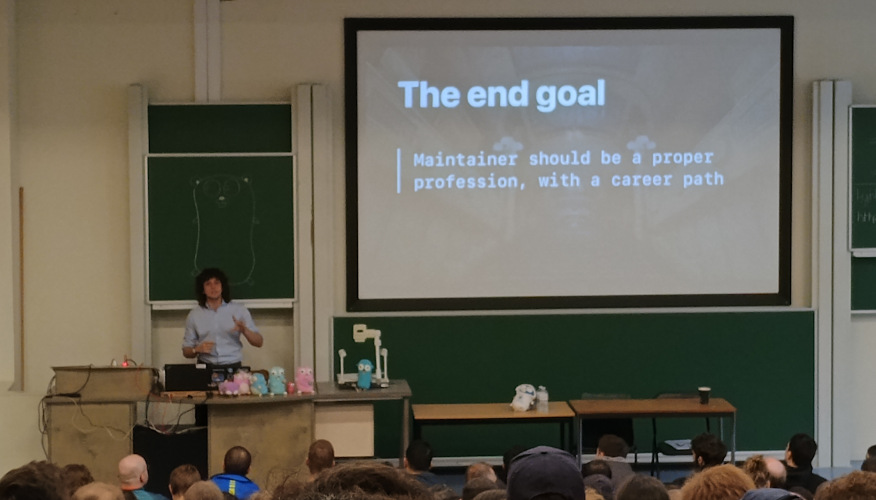
Sunday, day 2
Going down to sleep, however, I can't help but notice how stuffy my nose is. And though I try my best at wrapping myself with blankets, on Sunday I wake up with the dreaded FOSDEM flu—it's still mild, but definitely there. I consider staying at the flat because of it and just watching the live-streams, but in the end decide to go with a mask on and see if I can network some more. But honestly, the day ends up just being miserable, and networking is that much less effective with the mask on—so I'm not sure it is worth it.
That aside, the day goes like the previous one. I walk to the tram station, look around, find another person from FOSDEM, and start conversing. This time, it's a guy from Lithuania. We talk a bit about politics and a little about open-source on the way. We part ways upon arriving at the conference, and I head to some talks that are about to start: one about bringing fun to FOSS in J, and one about the journey of XWiki in K...
...except I don't make it to either, as I get myself in a long conversation at one of the stands. It's about CiviCRM, a system for non-profits to organize relationships with their constituents(/contacts)—which, is definitely needed around the few non-profit organizations I am part of, and I will have to pitch it to them.
After that, I walk over to the Graphana stand, and, to my surprise, manage to find a fellow Bulgarian staffing it at the moment. We chat a bit about the project, how we used it and how they made it.
Yet, unwilling to skip another talk, I swap contacts, and head off to the community devroom to listen to Mike McQuaid's talk on maintainer burnout. The speaker does a good job of augmenting common advice for setting healthy boundaries with an unique developer-oriented perspective, and adds a great note that we set boundaries for other people's sake and not just our own, as, after all, an early "no" is much better than a procrastinated "sorry I couldn't".
Taking a short break from the talks, I go over to the NixOS stand in the nearby-but-hard-to-find AW building. As NixOS is something I want to try some day, I decide to, just for fun, ask the person there to convince me not to use NixOS—which he thankfully fails to do. 🥲 (I should get around to that some day, so, expect to hear more of Nix in later posts)
Then, it is back to the community devroom for an excellent back-to-back combo of Kara Sowles's talk on open-source funding and Paris Pittman's talk on open-source maintainer "hats". The first one is full of concrete data and information showing how it is hard to be an open-source maintainer. The second one is full of ideas and inspiration showing how it is possible to be a maintainer even when it gets hard. Yet the two talks agree: having a well-funded maintainer is crucial for the longevity of any open-source project.
Next, I go to the Firefox stand in H to pick up a few stickers, as I missed pestered them with questions on Saturday.
After that, I swing by Emily Omier's lightning talk on how to make better project websites—ones that serve visitors by helping them evaluate the project faster.
Over a late lunch, I chat with a random person working on CADs and interested in computer graphics; after which I go to check out the Pierre-Étienne's talk on the Pijul version control system in K. It's inspiring to hear how he's used category theory to define his data structures, and now I'm thinking if I could eventually learn to do the same myself.
Finally, I end my list of bookmarked talks with Simeon's and Rob's workshop on WebExtensions back in H—which showcases some tools for testing and developing WebExtensions that look rather fun to use.
At that point, the conference is pretty much over, so I head to the J building where the last two talks will be held. On the way, I randomly approach a person going in without a group and start talking with him... only to discover he is also from Bulgaria and that I have him on my list of people to contact in my open-source career research—talk about coincidences! So, I ask all the questions I have about working with open-source in a large company, and we chat about the current state of SBOM (Software Bill of Materials, a way to track software dependences; helps with staying on top of licenses and vulnerabilities) and how it's used in such companies.
(Truly, God's hand had something to do with that last coincidence; I can live with the rest being "random", but that one is just too much. 😂)
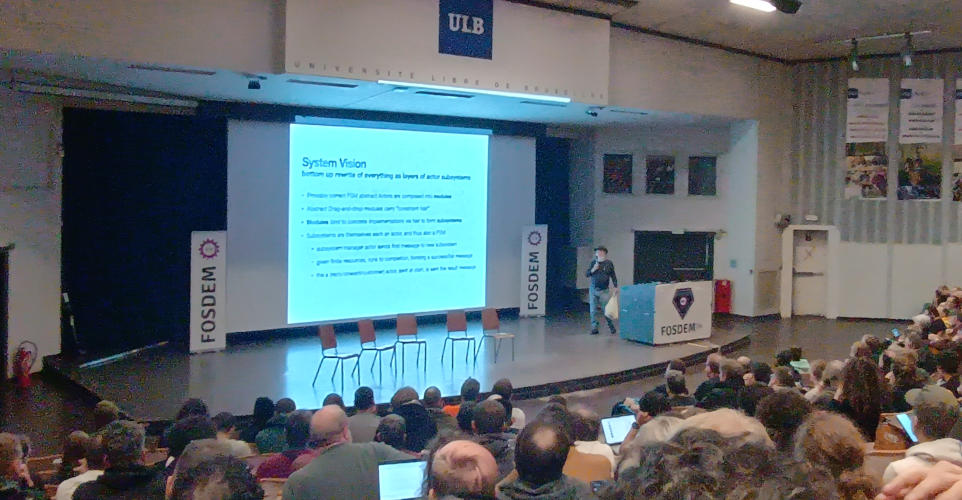
Afterwards, we watch the end-of-conference Highlights session—full of tidbits about topics like the new European software policies or the success of the FOSDEM junior track—as well as the official closing session. Then there comes a call for volunteers to help clean up the buildings, and as I feel far too tired to go for long beer dinners, I opt to stay around to help. We end up with a few hands too many though, so a lot of what I do is just ambling around rooms looking for a staff member or volunteer I might help. In the end, we all sit down for a sandwich dinner on a loong table. I chat a bit with a few volunteers near me, and we are all on our way.
~
But we shall meet again...
In 2025! 🎉
Takeaways
If I had to summarize how going to FOSDEM this year impacted me, personally, I would definitely list some of the following points:
- Network: I now know an extra 7~20 people who are enthusiastic in some way about open-source, whether they use it, make it, or otherwise are in it as a hobby—which, for the expenditure of just 4 days is a huge amount of people. Compared to the usual way of getting to know people by contributing to projects and gradually getting into a community, 4 days would hardly be enough to just get in the loop of things, let alone get to know people.
- Confidence: While I didn't find people excited to validate my idea of "I want to have a career in open-source! 🎉" (maybe I need to be more specific if they are to support it), I am now more confident that I can network with people and find others that have similar ideas as mine about freedom and open-source and technology. Plus, being able to hear talks from people I've admired for their work and then just come down to the stage and talk with them and ask them question was just incredible, and a good reminder that the world is not so unfathomably large.
- Perspective: I got to hear about various issues of the day politics, open-source licensing, open-source recognition, and open-source funding—and while every discussion impacted me in some way, a few topics that bear mention would be:
- European policies and open-source: Going to FOSDEM, I did not even know the European parliament is gradually embracing open-source. Apparently, politicians are realizing how critical open-source software is (which is good!) and are looking at ways to establish policies about it (potentially okay; hopefully they don't break anything) and to fund it (mixed feeling.. government-funded software could end up being made in ways that it sound good to bureaucrats instead of serving actual users; time will tell if they got it right or not).
- Open-source licenses: Previous communities I've been around have all favored using the permissive MIT/Expat license over more restrictive licenses; yet, perhaps motivated by the recent mishaps like the ElasticSearch license change, virtually all of the people I spoke with at the conference insisted that the copyleft GPL license (or AGPL, or perhaps with an app store exception) is better than the MIT license for open-source software going forward—and also universally disagreed with the likes of the BSL and SSPL licenses. From cursory exploration, I tend to agree that copyleft sounds better, even if, as some have observed, it depends on intellectual property rights; but I will have to think it through a bit more—perhaps in an upcoming article.
- Open-source funding: It was good to see that more and more people are recognizing that maintainers need funding and are building various business models to accommodate them better. However, it still takes a fair amount of effort and luck to get an open-source project sufficiently funded. So, while things are looking up from what they used to be, open-source funding is a bit more dire than I'd hope it would be.
- Involvement: Apparently, I had forgotten the simple truth that people working on projects don't magically know what their users need and that if I want to see something changed, I should at the very least say so. Plus, it was a reminder that there are real people working on those projects, and that it's not that hard to get in touch with them—just what I needed to get out of my slump of not writing messages to people.
Considering the goals I had set of learning more about open-source careers and meeting more people related to open-source, I would say the conference was a success, overall. And, given that I got extra perspective on things I did not know about, I would say it was a great success. 😊
Takeaways for FOSDEM-goers
Meanwhile, if I had to pull out some takeaways of things I that went right or that I would try to correct next year or that you could try if you are going to a conference yourself, the list would naturally be a lot more practical:
- Don't be afraid to talk with people at conferences. I can recall only one or two people who approached me before I started talking with them—and it would have been incredible if more people just talked with each other randomly. The more we know each other in the community, the more likely we can help each other—be it with encouragement, with ideas, with code (or non-code) help and contributions, or even financially, perhaps. But all of that won't happen on its own if we go just meet a few old friends from previous years and don't try to meet anyone new.
- Don't underestimate God's providence (or "luck", if you will). Counting through my experience at FOSDEM, I had at least 5 coincidence meetings that I never could have predicted or expected and, looking back, couldn't have arranged better if I had known I'd meet those specific people. I don't know if any of those meetings will lead anywhere, but even if they don't, they were still quite blessed.
- Be ready to ask random questions and follow up on what you've heard—it helps a lot to keep the discussion bouncing! And also, be prepared to tell about yourself; it's not bragging, it's helping others to get to know you better and will naturally directs the discussion towards your mutual interests.
- Don't follow my example when it comes to forcing yourself to go despite being sick or tired—just rest. For me it was miserable, even more tiring, and I bet I could have networked a lot more if I had stayed in and chatted with life-stream viewers instead. Plus, it made recovering after the conference so much slower.
- On that same note, if you are traveling, bring some symptom relief medicine along, just in case. That would have definitely saved me some trouble with the cold I had.
- Don't lug a laptop around if you aren't using it. Like, really, what was I thinking to do with that, anyway? 😂
- Don't stress. I messed up my prepared "elevator pitch" a lot of times, forgot to introduce myself to some of the people I talked with, started conversations at all the wrong times and missed the talks I was going to—and well, mistakes are inevitable, and not all of them can be fixed, but we are here can keep going even after some happen. So, have peace, and keep trusting that things are going for the best.
See also Gaurav Kamathe's article on how to make the most of tech conferences; it helped me prepare and make sure I don't miss out on any part of the experience.

Browse more articles?
← Reflections on two years of using Colemak Articles tagged life (2/9) Dishes before music - an experiment in habits →
← Reflections on two years of using Colemak Articles on this blog (2/42) How (not) to make a website →